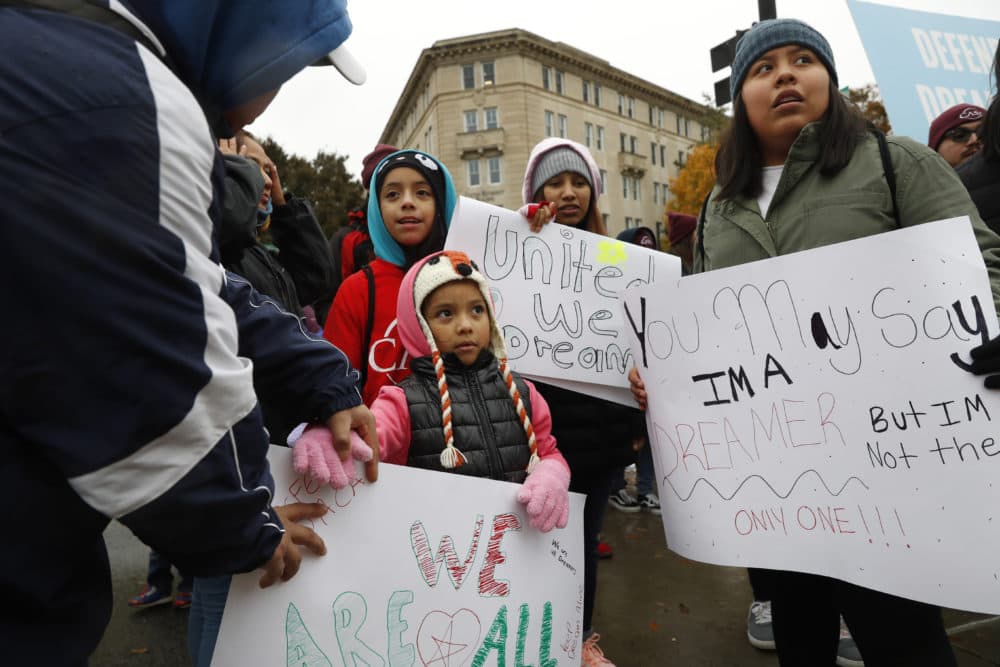Advertisement
As Supreme Court Considers DACA's Fate, Immigrants And Officials Weigh Impact

The U.S. Supreme Court’s ruling on President Trump’s attempt to cancel a program that shields young immigrants who were brought into the country illegally as minors will have major repercussions — in Massachusetts and across the U.S.
As the justices heard arguments Tuesday regarding Trump’s 2017 decision to try to end the Deferred Action for Childhood Arrivals program, those supporting DACA and its recipients protested outside the court and across the country, including in the Bay State.
In Cambridge, Democratic U.S. Rep. Katherine Clark joined the city's mayor, Marc McGovern, and DACA enrollees and members of the immigration advocacy group MIRA in calling not only for DACA to be upheld, but also for legislation giving young so-called “DREAMers” a path to citizenship.
"Trump's morally bankrupt decision to end this program in 2017 was a sad betrayal of American values,” Clark said.
DACA participant Carlos Aguilar, who came from Mexico when he was 14, is now a Ph.D. student at Harvard University. He says his success story is about more than education; it's also about his parents' dreams and sacrifices.
"I am scared. I am tired,” Aguilar said. “I know that many of us don't want to continue doing this and really want protection not only for us but for our families."
President Obama implemented DACA in 2012 to shield from deportation young immigrants brought illegally to the country by their parents, and to allow DACA enrollees to apply to legally work, attend college, or join the military.
At court Tuesday, the Trump administration argued that it not only has the authority to end the program, because it was meant to be temporary, but that it also was required to cancel it because the Justice Department deemed it unlawful.
“DACA was always meant to be a temporary, stopgap measure that could be rescinded at any time,” U.S. Solicitor General Noel Francisco said.
Francisco suggested that the more than 700,000 DACA enrollees could not rely on the program because it was meant to be temporary, and said the Department of Homeland Security reasoned that the interests of those enrollees were far outweighed by its determination that DACA was likely unlawful.
Some justices pushed back. Justice Stephen Breyer pointed to the interests of the employers who hired DACA participants, the colleges and universities that have enrolled them, and the military in which they serve.
Justice Sonia Sotomayor said Trump promised to keep the program in place before he announced he would end it.
“The current president was telling DACA-eligible people that they were safe [and he] would find a way to keep them,” Sotomayor said. “He didn’t.”
Challengers to Trump's move, including Massachusetts and 15 other states, argued that the administration violated the Administrative Procedure Act, which prohibits “arbitrary and capricious” actions.
Attorney Theodore Olson called the president’s attempt to rescind DACA just that sort of arbitrary action, saying that the administration failed to "provide a reasonable explanation.” Olson pointed out that the court stopped the administration’s attempts to add a citizenship question to the 2020 Census for the same reason.
Justice Brett Kavanaugh, a Trump nominee, asked if the authority to rescind DACA rested with the executive at all. Olson conceded that it did, but said ignoring the reliance interests of those affected went beyond that authority.
The administration essentially said of the immigrants who rely on the program, “too bad about that,” Olson argued.
A decision is expected close to the end of the Supreme Court’s term next year — right in the middle of the presidential general election, in which immigration policy is likely to be a central issue.
Congresswoman Clark is calling on the Senate to take up the Dream and Promise Act, which she co-sponsored and which passed the House earlier this year. It includes a path to citizenship for those covered under DACA, which includes roughly 8,000 living in Massachusetts.
"This is really giving a future for those young Americans who are already meeting with great academic success, serving in our military, who are parents of American children,” Clark said. “This is what's at stake for our country. It is the fair and right and very American thing to do to support them."
Atkins reported from Washington. Dooling reported from Cambridge.

